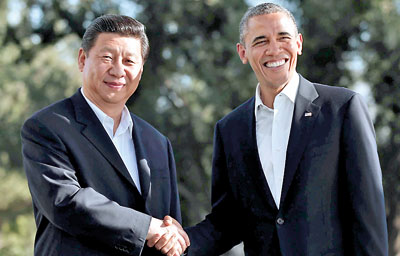Sunday Times 2
Barack Obama and Xi Jinping meet as cyber-scandals swirl
View(s):RANCHO MIRAGE, California (AFP) -Throwing formality aside at a desert retreat, the US and Chinese leaders pledged a new approach in ties, but President Barack Obama took the rising power to task on cyber-hacking charges. Skipping the usual summit pageantry, Obama and Chinese President Xi Jinping both went without neckties at a resort under the blazing California sun as they looked to forge a personal chemistry that could shape the years to come.

U.S. President Barack Obama meets Chinese President Xi Jinping at The Annenberg Retreat in Rancho Mirage, California (Reuters)
In their first meeting since Xi assumed power in March, Obama voiced hope the US superpower and fast-growing China “can forge a new model of cooperation between countries based on mutual interest and mutual respect.”"It is in the United States’ interests that China continues on the path of success because we believe that a peaceful and stable and prosperous China is not only good for the Chinese, but also good for the world and the United States,” Obama said before a leisurely dinner.
Hovering over the summit at the Sunnylands retreat was a vexing question for both countries — whether China’s rise to regional and global prominence will mean an inevitable clash with the United States. Obama wasted no time in hitting a key theme of the visit from the US side — complaints of an alleged Chinese Internet spying effort targeting American military and commercial secrets and intellectual property.
He voiced concern over the alleged theft — which a recent study said was costing the US economy hundreds of billions of dollars a year — and urged “common rules of the road” to protect against hacking.
“President Xi and I recognise that, because of the incredible advances of technology, the issue of cyber security and the need for rules, and common approaches to security, have become increasingly important,” Obama said. Xi said he wanted “good-faith cooperation” to clear up “misgivings” by the United States about cyber security, telling reporters that China was also “a victim of cyber attacks.”
Xi, who is expected to lead China during a decade in which it will overtake the United States as the world’s largest economy, reiterated his frequent, if occasionally vague, call for world powers to think differently about relations. “We need to think creatively and act energetically, so that, working together, we can build a new model of major country relationship,” Xi said.
“Our decision to meet so early I think signifies the importance of the US-China relationship,” Obama said. “Universal rights will ultimately be a key to success and prosperity and justice,” Obama said. In troublesome optics for Obama, the summit comes as he faces criticism over revelations that the United States has run a massive Internet and telephone surveillance program for security purposes.
Obama defends surveillance dragnet
WASHINGTON (AFP) -President Barack Obama has defended US spy agency programmes which trawl phone and Internet data as a “modest encroachment” on privacy needed to keep Americans safe from terrorism. “Nobody is listening to your telephone calls,” Obama said, seeking to quell public disquiet after two days of explosive revelations hinting at the scope of a vast and classified government data mining operation.
Obama, in San Jose, California, hit out at what he said was “hype” over reports the National Security Agency (NSA) logs details of millions of domestic calls, for possible later use in anti-terror operations.
He also defended a program called PRISM, in which NSA and FBI agents are tapping into the servers of nine US Internet giants, including Facebook, Google, YouTube, Apple and others, as they try to subvert terror plots originating abroad. “This does not apply to US citizens. And it does not apply to people living in the United States,” Obama said.
Civil liberties and privacy groups have raised alarm at the two programs, reported by the Guardian and Washington Post newspapers, warning they are “Orwellian” and could be unconstitutional. Obama said he welcomed the debate, but warned the programs had previously been kept under wraps to avoid tipping off America’s enemies and said they made only “modest encroachments” on privacy.
“I think it’s important to recognise that you can’t have 100 percent security and also then have 100 percent privacy and zero inconvenience. We’re going to have to make some choices as a society,” he said.
Follow @timesonlinelk
comments powered by Disqus

